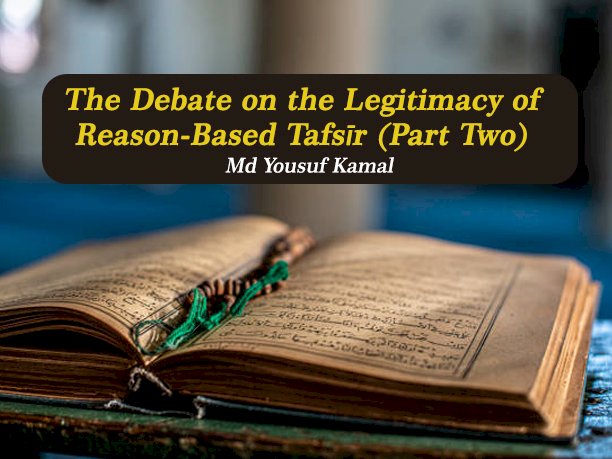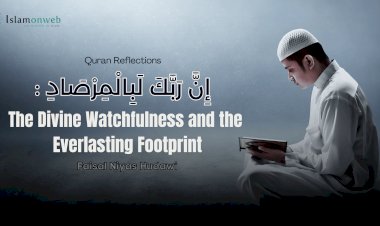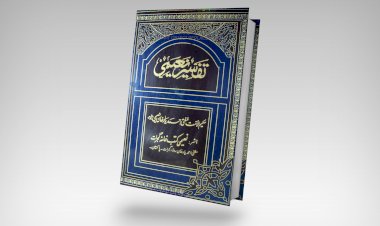The Debate on the Legitimacy of Reason-Based Tafsīr (Part Two)
Introduction
It started with disputes in the 1st/7th and 2nd/8th centuries on Tafsīr based on reason and based Tradition as well as on ‘Ilm vs. ra’y’, even though I'lm -traditional knowledge, and Ray-the rationale debates were mainly concerned between jurists rather it to be in Tafsīr methodologies.
Considerably during the era of Tabi’un, the emergence of various political–theological groups in Islam led to the term ‘Ray’ beginning to connote exegesis that several scholars believed as sectarian or bid’ah. In addition, Mu’tazili theologians and linguists like Abdul-Jabbar, al–Zamakhshari had provided strong evidence and continuous support for the reason-based interpretation.
Consequently, this exegetical type came to be a topic of debate. There were two teams, one opposing its legitimacy and another proposing its legitimacy with their arguments and evidence. Below is given the discussion of both sides’ arguments.
Opposing Views
The prominent scholars like Ibn Taymiyyah[i], Ibn Kathir, and Al-Suyuthi opposed reason-based tafsīr. They strongly believed that such interpretation is of so-called Mubtadiah (innovation that has no roots in Islam), which makes nothing but distortions of prophetic interpretation, so of the companions' commentaries and successors. They bolster their claims with some sound arguments and consolidate them with pieces of evidence, which are as follows;
- This interpretation based on Ray’ is simply ‘saying on Allah without knowledge’, which is prohibited. It comprises two pieces of evidence[ii]:-
(i) Qur’anic one;
(۔قُلْ إِنَّمَا حَرَّمَ رَبِّىَ ٱلْفَوَٰحِشَ مَا ظَهَرَ مِنْهَا وَمَا بَطَنَ وَٱلْإِثْمَ وَٱلْبَغْىَ بِغَيْرِ ٱلْحَقِّ وَأَن تُشْرِكُوا۟ بِٱللَّهِ مَا لَمْ يُنَزِّلْ بِهِۦ سُلْطَٰنًا وَأَن تَقُولُوا۟ عَلَى ٱللَّهِ مَا لَا تَعْلَمُونَ)
{Say, "My Lord has only forbidden immoralities – what is apparent of them and what is concealed – and sin, and oppression without right, and that you associate with Allah that for which He has not sent down authority, and that you say about Allah that which you do not know."} (Quran, 7:33)[iii]
وَلَا تَقۡفُ مَا لَيۡسَ لَكَ بِهِۦ عِلۡم
{"And do not pursue that of which you do not have knowledge."} (Quran, 17:36)[iv]
(ii)A rationale one:
Such an interpreter is not assured in his sayings. While the lack of assurance indicates Zann (assumptions). The interpretation with Zann is ‘saying on Allah without knowledge’.
- The interpretation or Ta'wil of ambiguous or obscure verses cannot be known except to Allah and the Prophet ﷺ.
(i) “……. and we have sent down to you (Muhammad) (also) the message; that you may clearly explain to men what is sent for them’’.[v] (Quran-16:44)
- The prophet’s narrations refuse the interpretation based on
Ray. Some relevant hadiths are given below:
(i) Whoever interprets the Quran with reason, his place in hell has been prepared.[vi]
(ii) Whoever interprets the Quran with reason; if he is right, then he is still wrong.[vii]
- The reports and quotations of Companions and Successors indicate the refusal of reason-based exegesis.
(i) Hazrat Abu Baker refused to understand the meaning of the Quran when he was asked ‘Wa Fakihatan wa abban’ (and fruits and herbage).[viii]
(ii) Sha’bi said: Three things I won’t say till I die: Al-Qur’an, al-Rūh, and Al-Ra’y.
One major reason for opposing it is the great involvement of Ahl-bid’ah by this reason. Al-Qattan stated that Ahl-bid'ah has taken advantage of Qur’anic exegeses like Abdurrahman bin Keesan, Al-Asham, Al-Jubbai, and others.[ix]
Supporting Views
They are proponents led by Abu Hamid al-Ghazzali, Ibn Atiyyah Al-Qurtubi, and Abu Hayyan. Here the refutation of opponents’ arguments is presented first, then their arguments which is then followed by the refutations:
- The first argument of the opposing side indicates that ‘it is saying on Allah’ based on assumptions(Zann). It is refuted when ‘Zann' is based on 'knowledge'. Qur’anic verses are against Ra’y when it is 'saying without knowledge'.[x]
- The second argument is refuted by Ibn Atiyyah; he argued that although the Prophet (ﷺ) was given the responsibility to explain the Quran, his interpretation was apt to the necessities of that time for people of that particular period. The time-space factors require further intellectual exertion to clarify even the prophetic narrations and interpretations of Quran that required scholastic reasoning (Ra’y) and explanation.[xi]
- Anbari says in favour of reason-based Tafsīr in interpreting, “The Hadith, cited above from Sunan Tirmidhi, has 2 explanations. First, he who speaks in problematic passages uttering his views which have no dependence on early generation, Companions and Successors, that is exposed to God’s anger.
Supporters bring the following evidences also:
- The Qur’an encourages thinking and pondering, for example:
(i) ‘….we have revealed up to thee, (O, Muhammad) so that men may ponder over its messages and those who are endowed with insight may take them to heart. (Quran-38; 29)
- A rational argument is that ‘if the interpretation based on reason gets restricted, Ijtihad will, subsequently, be prohibited which tends to erase a lot of Ahkam. Thus, it is also not prohibited even the prophet has promoted self –execration providing Mujtahid with a reward though he erred.[xii]
- The Sahabah have different views and various interpretations. Surely, each of them didn’t hear what the Prophet ﷺ interpreted, neither the prophet interpreted the whole Quran, nor he explained each verse’s meaning. So, Sahabah interpreted Quran using their independent reasoning.
- The prophet recognised ibn Abbas by saying ‘Allahumma Faqqihhu Fiddin wa ʿallimhu al-ta’wil’ (Allah, make him understand the religion and teach them the interpretation of al-Quran).[xiii] Al-Dhahabi writes that this Ta’wil indicates al-Tafsīr bi al-Ra’y and refers to ijtihad.
Concluding Remarks
Al-Dhahabi records sciences[xiv] which are highly indispensable for a qualified exegete of the Quran.
- Arabic language
- Ilm al-Nahw: Syntax
- Swarf: Morphology
- Ishtiqāq: Derivation or etymology
- Balāghah: Rhetoric
- Qira'ah: Recitation
- Usul-ul-Din: Principles of religion
- Usul-ul-Fiqh: Principles of jurisprudence
- Asbab al-Nuzūl: Occasions of revelation
- Ilm al-Qasas: Science of stories
- Naskh: Abrogation
- ‘Ilmu al-hadith: Knowledge of the tradition that explains the verse of Mujmal and Mubham,
- Ilm al-Mawhibah: the knowledge given by Allah to those who practise their knowledge and his heart is pure.
Al-Zurqani Reason-based exegesis into two: (1) 'Al Tafsīr Bi Al-Ra'y Al-Mazmum' (blameworthy), and 'Al-Tafsīr Bi-Al Ra'y al-Mamduh /Mahmud' (praiseworthy).[xv] The latter is exegesis using the intellect to understand Quranic verses based on sound knowledge of the Arabic language and implementation of principles of Tafsīr while the former is pure intellectual exegesis.
Reason-based exegesis can be said as a derivational form of tradition-based exegesis.[xvi] As a result, it can be observed that Tafsīr based on the reason is legitimate. It's a crystal-clear fact that the 'Al-Tafsīr Bi-Al-Ra'y or Ijtihad' is an essential need of the hour in the wake of several contemporary issues. This interpretation, the praise-worthy only, has also opened the doors to a multiversity of knowledge and sciences like in modern-day practical science, physics philosophy and societal behaviour. Several types of knowledge got to be produced by legalising it from a very early stage of Islamic development.
Bibliography
- Abdullah Saeed. (2006) ‘Interpreting the Qur’an Towards a Contemporary Approach’. London; Routledge.
- Al-Asfahani, Imam al-Raghib, ‘Muqaddamatu Al-Tafseer’.
- Al–Dhahabi, Muḥammad Husayn a ('al-Tafsīr wa al-mufassirun', vol.1, Cairo: Maktaba Wahbah.
- Ali Suleiman Ali. ‘Qur'anic exegesis’. IIT, Books in-brief series.
- Al-Suyuṭī, Jalāl al-Din. (1974-1975) al-Itqān fi 'ulum al-Qur'an, ed. Muhammad Abu-el-Fadl Ibrahim, Vols. 1-4; Cairo: Al-Hay'ah al-Misriyyah al-'Āmmah li al-Kitāb.
- Mohammad Mujid Al Deen Al Firozabadi. (2005) ‘Al-Qamūs Ul Muhīth, VIIIth Edition, Beirut.
- Hanbal, Imam Ahmed Bin Muhammed. (2001) Musnad Imam Ahmed, Muassasah Al-Risala.
- Ibn Manzur. (1955-1956), Lisanul al- ‘Arab’: Vol.14. (Beirut: Dar Sadir.
- Ibn Taymiyyah. (1983) Majmu'at al-rasa'il wal-masa'il, Bayrūt: Dār al-Kutub al-'Ilmiyyah.
- Ibn Taymiyyah. (1972), Muqaddimah fi uṣul al-Tafsīr, ed. Adnan Zarzour, 2nd ed, Bayrūt.
- Ilyas, Yunahar. (2014) ‘Kulliyah Ulumul Quran’, Yogyakarta, Itqan publishing.
- Norman Cadler. (1993) ‘Tafsīr from Tabari to Ibn Kathir: problems in the Description of a Genre, illustrated with references to the story of Abraham’, in G.R. Hawting and Abdul Kader A.Shareef (eds) Approaches to the Qur’an, London: Routledge.
- Qattan, Manna’ al-Khalil. (2000) 'Mabahis Fī Ulūm al-Qur'ān', Maktabah Al-Ma'arif.
- Tabari, Abū Ja'far Muḥammad b. Jarīr. (2000). 'Jāmi' al-bayān fi ta'wil ay al-Qur'ān', Bayrūt: Dār al-Fikr.
- Zarkashi, Badr al-Din Muḥammad b. 'Abd Allah, (1957), 'al-Burhān fi ‘ulum al-Qur'ān', Bayrūt.
- Zurqānī, (2001) Muḥammad Abd al-Azīm al-, Manāhil al-'irfān fi 'ulum al-Qur'ān, vols. 1-2, Bayrūt: Dar al-Hadis.
Endnotes:
[i][i] The arguments are arabic numerated, while evidence are roman numerated
[ii] Al- Dhahabi, p.183-184
[iii] Quran, Surah 'Araf,7:33.
[iv] Quran, Surah Isra, 17:36.
[v] Quran, Surah Nahl, 16:44.
[vi] Sunan AL-Tirmidhi, ‘Abwab Ut-Tafsir’ (n.d.) vol.2, P. 157
[vii] Ibid.
[viii] Ibn Taymiyyah. (1983) Majmu'at al-rasa'il wal-masa'il, Bayrūt: Dār al-Kutub al-'Ilmiyyah, Vol. 8, P. 372
[ix] Qattan, p.342
[x] Al-Dhahabi, p.184
[xi] A. S. Ali, p. 05
[xii] Hadith : ‘whoever makes ijtihad and he is right will earn two rewards. However, he is wrong, and will earn only one reward’.
[xiii] Hanbal, Imam Ahmed Bin Muhammed, ‘Musnad Imam Ahmed’, Muassasah Al-Risala, (2001). vol.5, p.215; Which Means ‘O God Understand Him In The Religion And Teach Him The Exegesis’
[xiv] Al-Dhahabi,p.189
[xv] Zurqānī, Muḥammad Abd al-Azīm al-, Manāhil al-'irfān fi 'ulum al-Qur'ān, vols. 1-2, Bayrūt: Dar al-Hadis.(2001) vol, 2p.45.
[xvi] Calder names Qurtubi Believing So,P.132
About the author: Md Yousuf Kamal is from Bihar, Degree First Year student, Department of Qur’an and Related Sciences, Darul Huda Islamic University
Disclaimer
The views expressed in this article are the author’s own and do not necessarily mirror Islamonweb’s editorial stance.
























Leave A Comment